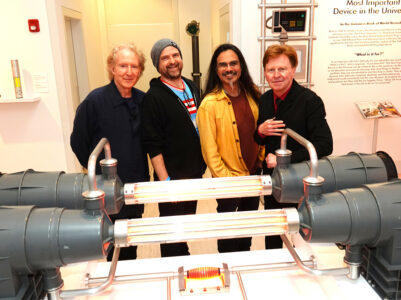Amid cuts, local PBS, NPR stations vow to persevere
President Donald J. Trump on Thursday signed a $9 billion rescissions bill that revokes money Congress originally allocated and has already approved in the budget for foreign aid and public broadcasting.
The bill eliminates $1.1 billion over the next two years for local radio and TV stations supported by the Corporation for Public Broadcasting.
In the immediate aftermath, NPR CEO Katherine Maher called the cut “an unwarranted dismantling of beloved local civic institutions, and an act of Congress that disregards the public will.”
In June, PBS Western Reserve President and CEO Natalie Pillsbury explained to The Vindicator that those dollars provide stations with community service grants for the work they do in the community. The funding is distributed using a formula developed by the CPB, based on audience and local financial support, among other factors.
PBS Western Reserve owns and operates the local PBS stations WNEO — serving Youngstown, the Mahoning Valley and parts of Western Pennsylvania — and WEAO, serving Cleveland, Akron and Canton. PBS Western Reserve has the largest footprint of any of Ohio’s eight public broadcasting stations, covering an audience of 4.9 million viewers.
Pillsbury said the federal cuts mean $1.2 million in federal funding for those stations is gone from their fiscal year 2026 budget.
“These cuts came after we’d already finalized our budget. So now we are in a budget revision process,” she said.
Pillsbury said public broadcasting also faces likely cuts from Columbus to the tune of $300,000. That’s the same amount as the surplus PBS Western Reserve baked into its budget. Although she said PBS has announced that it will be offering stations relief from their dues for carrying PBS programming equal to the percentage they rely upon federal funding. Pillsbury said that is 22% for her organization, which amounts to about $300,000.
PBS Western Reserve has a staff of 24 people and operates on a budget of about $5 million annually, Pillsbury said.
With the money they receive from CPB, they produce local news and documentary content — stories about people, places and events in the communities they serve — and they partner with other local organizations to reach schools and teachers, families and children, to provide educational resources and outreach to help them understand the resources offered.
In the past six months, Pillsbury said WNEO and WEAO have hosted close to 40 local events that include lessons with hands-on activities and a book giveaway. All the events are free to the public.
For now, she said she expects them to weather the storm.
“Internally, we found some areas where we’ll be able to reduce expenses and move some higher ticket items to next year, so we made some changes to the budget that don’t affect staff or services,” she said. “That leaves us with about $600,000 we need to make up for this year.”
Pillsbury said PBS Western Reserve has, naturally, increased its fundraising goal, and she is optimistic they will meet it this year.
“We’ve already seen a surge of support from our communities,” she said. “The good news for our organization is that we have increased donor base by 18% from 14,400 to 17,250 members
So that’s a pretty significant growth. And we ended fiscal year 25 having raised $500,000 more than our revenue goal.”
She said they have brought in more corporate sponsors and are building relationships with local philanthropic foundations.
“Finding this additional $600,000, of course it’ll be a challenge, but it feels within reach,” she said. “There’s a lot of enthusiasm for supporting the station.”
On Wednesday and Thursday, Pillsbury said, their stations held “state of the station” open house events to inform members about what the organization’s current situation is and what is needed going forward. She said about 150 people attended between the two events.
“The more challenging years will be next year and the following year,” she said. “Right now, the cuts are front of mind so we’ll see a swell of giving. But two or three years out, we have to think about a budget that’s sustainable, and not relying on a one-time swell that will likely not be replicable in the future. I do think because of the enthusiasm we’ve seen this year, it gives us time to plan, which is what we need.”
Pillsbury said PBS Western Reserve has relaunched its volunteer program, looking for more volunteers, and it will be sharing assets and tools with the community online so supporters can spread the word on what the cuts mean, help raise awareness, and act as ambassadors of the station. Those should be available by the end of next week, she said.
She said they also have not given up hope on the state funding front.
“As a system of public media, all of the station leaders meet regularly and work closely together,
and we are working to see if there’s a way to stop those cuts, and even restore some of the funding for educational services that was cut in the past year,” she said.
Pillsbury also said that America’s Public Television Station, CPB’s government relations arm, will be trying to get funding back into the federal budget as soon as next year’s budget process begins.
Other regional public broadcasting stations also are fighting to maintain their programming.
Ideastream Public Media, which took over operations of WKSU, said the rescinded CSG funding represents approximately $2.6 million, or just under 10% of its annual operating budget.
“This moment represents a pivotal challenge not only for Ideastream, but for the entire public media system — PBS, NPR, and local stations nationwide. The future sustainability of public media will depend on how organizations adapt to evolving circumstances, strengthen collaborations, and innovate to serve their communities,” Ideastream wrote in a press release following the bill’s signing.
The company stated that its FY2026 budget, which begins Oct. 1, is being developed with a plan to preserve services at the current levels.
“What will not change is our unwavering commitment to providing trusted news and information, music, arts and culture, and educational services that our audiences across Northeast Ohio and beyond have relied on for decades,” said Kevin Martin, Ideastream President and CEO. “We recognize the uncertainty this development brings, but we also know that our greatest strength lies in our people, our community, and our shared purpose. We will continue to operate with resolve and transparency as we work to build a sustainable path forward for public media.”
Summit FM in Akron is another station supported by CPB. Summit said the recissions bill cost it $130,000 in annual funding, 10% of its operating budget, which it has relied upon for 30 years.
“This decision affects not just The Summit FM, but all 386 radio stations that receive CPB Community Service Grants. Together, we operate more than 1,300 stations that reach 99% of the U.S. population,” the station wrote in a press release after the signing. “Our ability to champion local musicians, provide educational opportunities, and serve as a vital community resource hangs in the balance.”
The Summit provides scholarship programs for aspiring musicians and broadcasters,
musical instrument donations to schools and community programs, wellness programming to support mental health and community well-being, local music support and promotion, nonprofit community event partnerships, and educational programming and community resources communities have come to expect from stations like the Summit, WNEO, WKSU and others.
However, just like PBS Western Reserve, the station’s supporters rallied around it in the aftermath of the recissions bill’s passage and signing.
“Thanks to YOU, our loyal audience, we hit our goal of $130,000 in just three days. It’s the single most significant fundraising effort in Summit FM history,” they wrote in an email to members. “While we may have lost our CPB funding, you helped keep the music alive. Because this amazing Summit FM community showed up, we’ll continue to build connections through music and meaningful content. You just proved that our shared vision works.”
WYSU at Youngstown State University did not respond to The Vindicator’s request for information or an interview about its funding and programming.




